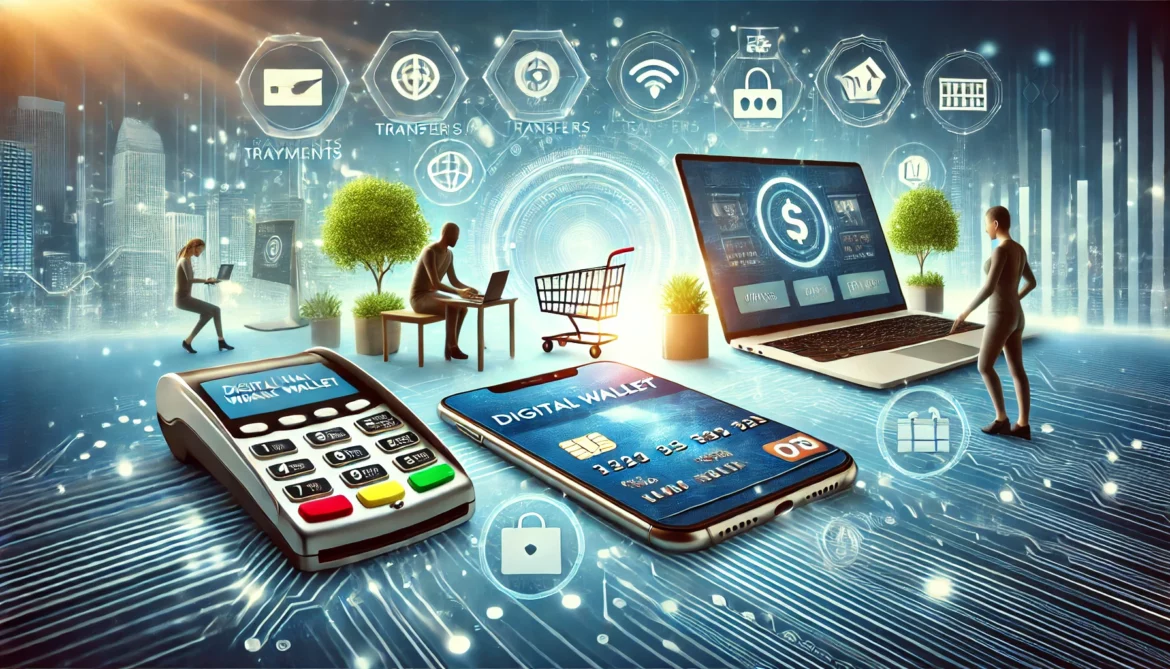Table of Contents
Financial transactions have always been at the core of human interaction, evolving alongside society’s technological advancements. Digital wallets have emerged as a natural progression of this evolution, offering unmatched convenience, enhanced security features, and a seamless user experience. Whether it’s paying for groceries, subscribing to a service, or making a deposit with Bitcoin, digital wallets are changing the landscape of online transactions.
Digital wallets have redefined what it means to transact online, focusing on ease, security, and efficiency. By simplifying the payment process, safeguarding personal data, and providing swift access to funds, these wallets are not only modernizing our buying habits but also improving the overall digital experience. Their influence is far-reaching, contributing significantly to financial inclusion and elevating the standard of online commerce.
The Evolution and Benefits of Digital Wallets
The evolution of payment methods has always been characterized by efforts to increase convenience and security. Once dominated by cash, the financial landscape saw the rise of credit and debit cards, and eventually the digital shift led us to online banking and payments. Digital wallets are a continuation of this evolution—they are the culmination of decades of development toward faster, more secure, and more efficient payment solutions.
A digital wallet, essentially, is an electronic device or software-based system that allows users to store payment information securely and use it to complete transactions. Apple Pay, Google Wallet, PayPal, and other similar platforms have quickly become household names due to their ease of use. These platforms have taken the hassle out of remembering card details and managing physical wallets, giving users the freedom to make payments with just a click or a tap.
One of the biggest draws of digital wallets is the sheer convenience they offer. Users can link multiple payment methods to a single digital wallet and choose which one to use based on their preference at the time of payment. The process of completing a transaction, which once required multiple steps, now takes seconds. Contactless payments—facilitated by NFC technology in digital wallets—are another way in which these systems have enhanced user experience, allowing for rapid and secure checkouts in both physical and digital environments.
Improved Security and Financial Inclusion
One of the most significant advantages of digital wallets is their robust security features. Unlike traditional payment methods, which often involve sharing sensitive information like card numbers and expiration dates, digital wallets use advanced encryption technologies and tokenization to keep user data secure. Tokenization replaces sensitive data with unique symbols or tokens, ensuring that any intercepted information is useless to fraudsters. Additionally, biometric authentication features—such as fingerprint scanning and facial recognition—add an extra layer of security.
Many digital wallets also incorporate two-factor authentication (2FA) as an additional safeguard. With 2FA, users must confirm their identity using a secondary device or code, making unauthorized access much more difficult. These layers of security help protect both the users and merchants from fraud, creating a more trustworthy digital ecosystem.
Beyond security, digital wallets are playing a crucial role in making financial services more accessible, especially for unbanked populations. In many developing regions, a large portion of the population lacks access to traditional banking services. Digital wallets provide a bridge for these individuals to participate in the economy, offering a simple, affordable way to store and manage money. The use of digital wallets also supports small businesses and freelancers, who may not have the resources to set up traditional point-of-sale systems but can easily receive payments through mobile platforms.
For example, in countries like Kenya and India, digital wallets and mobile money services have dramatically changed the financial landscape. They have helped bring millions of people into the formal economy, enabling them to save money, receive salaries, and make payments without needing a bank account. The impact of digital wallets extends far beyond convenience—they are fundamentally changing lives by fostering greater financial inclusion.
Impact on E-Commerce and Challenges
The rise of digital wallets has had a profound effect on e-commerce, making the online shopping experience more streamlined and convenient. With payment details already stored securely, customers are just a click away from completing a purchase, which has contributed to an increase in impulse buying. The seamless checkout process removes much of the friction traditionally associated with online transactions, resulting in higher conversion rates for retailers and a more satisfying shopping experience for consumers.
Digital wallets are also a significant driver behind the growth of mobile commerce (m-commerce). With more people using smartphones to make purchases, digital wallets provide an ideal solution for secure and efficient mobile payments. They enable consumers to shop on the go, whether they are commuting, traveling, or simply away from their computers. This trend is pushing e-commerce platforms to optimize their services for mobile users, further enhancing the shopping experience.
Despite these benefits, digital wallets are not without challenges. Privacy concerns are at the forefront, as the sensitive information they handle makes them prime targets for cyberattacks. While encryption and tokenization are effective security measures, no system is completely immune to breaches. The reliance on technology also poses a risk; users may face challenges if their devices malfunction or if they lose access to their accounts.
Regulatory issues further complicate the growth of digital wallets. Compliance requirements vary significantly from one country to another, posing challenges for digital wallet providers that wish to operate globally. Digital wallets must navigate a complex web of financial regulations, anti-money laundering (AML) protocols, and customer data protection laws—all of which are crucial for maintaining user trust but can create operational hurdles.
The Future of Digital Wallets and Conclusion
The future of digital wallets is brimming with potential, and we are only beginning to understand their transformative power. One emerging trend is the incorporation of cryptocurrencies into digital wallets, allowing users to manage both traditional currencies and cryptocurrencies within a single platform. This feature is particularly significant as the popularity of digital currencies grows, providing a convenient way to, for instance, making a deposit with Bitcoin or paying for services directly in crypto.
Super apps—platforms that bundle various services into a single application—are also gaining traction, with digital wallets playing a central role. These super apps combine payment solutions with other functions such as messaging, food delivery, and transportation, providing a comprehensive digital experience that blurs the lines between different aspects of users’ daily lives.
The use of artificial intelligence (AI) to enhance the functionality of digital wallets is another promising trend. AI can help in personalizing user experiences, managing expenses, and detecting fraudulent activity in real-time. With AI integration, digital wallets are expected to become even smarter, more intuitive, and more secure.
As digital wallets continue to evolve, they are also set to bridge the gap between online and offline payments. In physical stores, digital wallets will become the norm rather than the exception, further integrating into our daily routines and providing a seamless experience regardless of the shopping medium.
Digital wallets are revolutionizing how we interact with money in our digital age. Their ability to enhance convenience, boost security, foster financial inclusion, and shape the e-commerce landscape is evident. As these wallets continue to evolve, they will undoubtedly reshape the way we think about payments, moving us toward a future where financial transactions are faster, safer, and more inclusive. The ongoing development of payment technology will have far-reaching implications, not only for how we shop but also for how we live our digital lives—making every interaction more connected and effortless.









